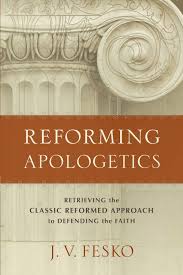Book Review: Reforming Apologetics (2)


Some Points of Appreciation
There are some points at which I genuinely appreciate Reforming Apologetics. For example, I agree wholeheartedly with Fesko’s approach to scholasticism. In the line of Muller and others, he understands it as an academic method, rather than a school of thought. Fesko is quite correct to see scholastic patterns in Calvin’s Institutes. Since I agree with those assertions, I also have no problem agreeing that Van Til at times over-reached with his claims about Calvin versus scholasticism. Of course, it has to be said that in this Van Til was really a child of his times. While he understood scholasticism to be a method, Herman Bavinck (arguably Van Til’s greatest influence) also contrasted Calvin with Protestant scholasticism (e.g. Reformed Dogmatics, vol. 1. 180).
Van Til’s assessment of Thomas Aquinas also comes under Fesko’s scrutiny. Of course, some presuppositionalists have long recognized problems in Van Til’s description and analysis of Aquinas. Some were noted by John Frame in his 1995 book, Cornelius Van Til: An Analysis of His Thought. I can agree that Van Til was, at times, inaccurate in his descriptions of Aquinas, and therefore in his judgments too. Let me say two more things in that regard: First, Van Til’s proposal for Reformed apologetics does not stand or fall on his historical accuracy. The standard for judging presuppositional apologetics ultimately has to be the Scriptures. Second, we must acknowledge that, as Fesko writes, Van Til seems to get Aquinas mostly through secondary sources. These are chiefly Jacques Maritain and Etienne Gilson. Maritain and Gilson were Roman Catholic philosophers sympathetic to Aquinas. A question Fesko does not really tackle is whether Van Til gets Aquinas wrong on some points because he gets Maritain and Gilson wrong, or because Maritain and Gilson got Aquinas wrong. Fesko does think Gilson was wrong for seeing Aquinas as a philosopher (87), but that is as far as we get.
Not surprisingly, Fesko makes many points that are agreeable to presuppositionalists. It is no surprise because Fesko is a Reformed theologian and presuppositionalists are Reformed too. Naturally we are going to agree that we “need to approach unbelievers in terms of their God-defined status as covenant-breakers” (xiii). We will be shoulder-to-shoulder in affirming that “the non-Christian’s problem is not primarily epistemological but ethical” (123). Together we can affirm that “Only a sovereign work of the Holy Spirit can remove the detrimental noetic effects of sin and enable fallen people to love God and submit to his authoritative word in Scripture” (203).
Source Issues
There are a number of issues with the references used to substantiate some of Fesko’s claims. As an example, on page 63 Fesko claims that Calvin quotes positively from Virgil’s Aeneid in Institutes 1.5.5. This is to substantiate his claim that Calvin invoked the argument from design. However, if one looks at Institutes 1.5.5, the reference is not a positive one. Calvin is actually critiquing Virgil and other classical authors in this section. He heaps contempt upon Virgil: “As if the universe, which was founded as a spectacle of God’s glory, were its own creator!” There are other examples, but I will not belabour this point. Suffice it to say that careful readers will want to check the footnotes as to whether the references actually substantiate the points being made.
Apologetical and Theological Issues
One of the most important things readers value in a book is clarity. Clarity begins with definitions. There are times when Fesko provides good, clear definitions and then follows through with them. But there are also times when things become muddled. For example, on pages 115-120, Fesko is discussing Scott Oliphint and his views on Scripture and knowledge. In this discussion, words like “source,” “foundation,” “ground,” “knowledge” and “epistemology” are used without definitions and without distinctions. This leads to confusion as to what Oliphint’s position actually is. Fesko quotes Oliphint asserting that Scripture alone is the “ground and foundation of our epistemology” (115), but then on the next page claims that Oliphint is trying to support the idea that Scripture is the only source of all knowledge. How did he go from “ground and foundation” to “source”? How did he go from “epistemology” to “all knowledge”? These things are related, but not synonymous.
Still on the topic of definitions, Fesko adopts a partially idiosyncratic approach to the definition of faith. He discusses it in two places (21, 212). In both places, he rightly notes that Reformed orthodoxy has always defined faith as having three essential components: notitia, assensus, fiducia. Fiducia refers to personal confidence. Where Fesko gets one to raise an eyebrow is with his definition of notitia as “facts” and assensus as “comprehension of the facts.” Bizarrely, he refers to Muller’s Dictionary of Latin and Greek Theological Terms, but Muller does not support these definitions. Instead, Muller says that notitia means “knowledge” and assensus means “assent” or “agreement.” This quirk leads Fesko to write that unbelievers can receive the facts of Scripture (notitia), as well as having “a certain degree of comprehension of the facts” (assensus). But what is the difference between “receiving” and “comprehending”? As I understand it, unbelievers can in some fashion know biblical teaching (notitia), they may even affirm some of it as true (assensus), but yet without personal trust in Jesus Christ (fiducia) there is no saving, justifying faith.


